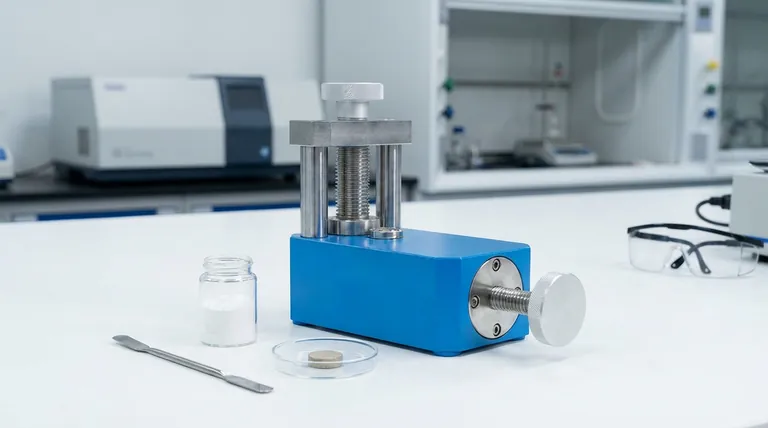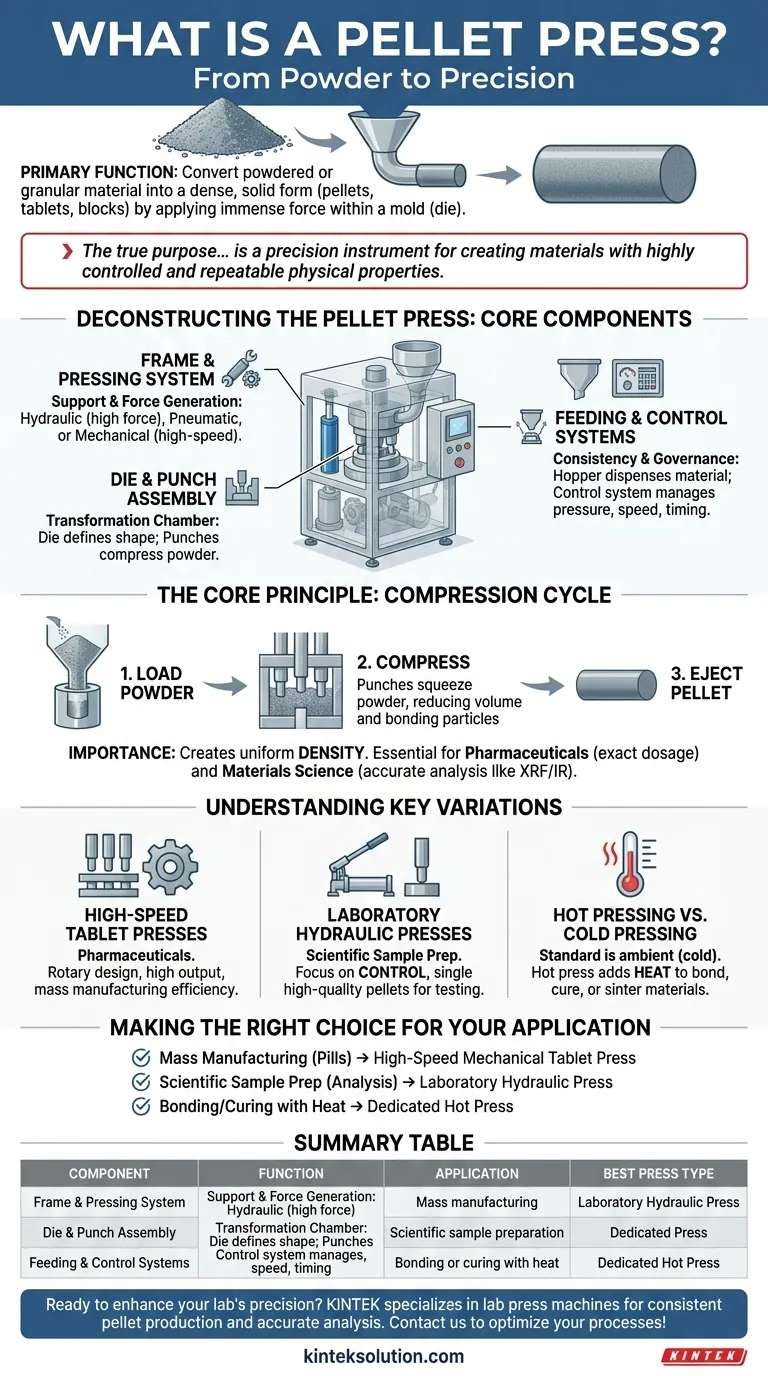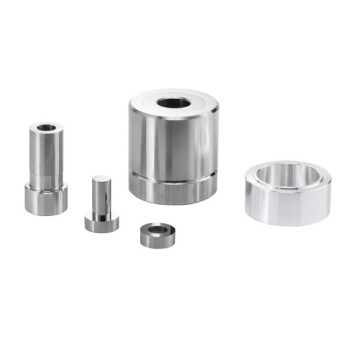At its core, a pellet press is a machine designed to convert powdered or granular material into a dense, solid form. Its primary function is to apply immense force to compress this raw material within a mold, known as a die, to create uniform pellets, tablets, or other block shapes with specific dimensions and density.
The true purpose of a pellet press extends beyond simple compression. It is a precision instrument for creating materials with highly controlled and repeatable physical properties, essential for applications ranging from pharmaceutical dosing to accurate scientific analysis.

Deconstructing the Pellet Press: Core Components
A pellet press operates through the coordinated action of several key systems. Understanding these components is crucial to grasping how it achieves precise results.
The Frame and Pressing System
The mainframe provides the structural support for the immense forces involved. The pressing system generates this force, which can be hydraulic (using fluid pressure for high force), pneumatic (using air pressure), or mechanical (using cams and gears, common in high-speed tablet presses).
The Die and Punch Assembly
This is where the transformation happens. The die is the mold that defines the shape and diameter of the final pellet. One or more punches move within the die to compress the powdered material fed into the die cavity.
The Feeding and Control Systems
For consistent results, the raw material must be fed uniformly. A hopper holds the bulk material, and a feeding device precisely dispenses a set amount into the die before each compression cycle. The control system governs the entire process, managing pressure, speed, and timing.
The Core Principle: From Powder to Precise Form
The conversion of loose powder into a solid pellet is a physical process driven by force. While designs vary, the fundamental steps are universal.
The Compression Cycle
First, a measured volume of powder is loaded into the die cavity. Then, the punches apply force, squeezing the particles together, reducing the space between them, and forcing them to interlock and bond into a solid mass.
The Importance of Density and Uniformity
This process creates a pellet with a specific, predictable density. In pharmaceuticals, this ensures each tablet contains the exact same dose of active ingredient. In materials science, it creates a uniform sample, which is critical for accurate spectral analyses like X-ray fluorescence (XRF) or infrared spectroscopy (IR), as non-uniform samples can produce misleading data.
Understanding Key Variations
Not all pellet presses are the same. The design is heavily optimized for its intended application.
High-Speed Tablet Presses
Used in pharmaceutical manufacturing, these are typically rotary presses with multiple die and punch stations. They are mechanical and designed for extremely high output, producing thousands of tablets per minute with exceptional weight and dosage consistency.
Laboratory Hydraulic Presses
Used for sample preparation in scientific labs, these presses are often manually operated. The focus is not on speed but on control. A hydraulic system allows the user to apply a specific, measurable pressure to create a single, high-quality pellet perfect for analytical testing.
Hot Pressing vs. Cold Pressing
A standard pellet press operates at ambient temperature (cold pressing). However, some applications require a hot press, which integrates a heating system. This allows for the simultaneous application of heat and pressure to bond, cure, or sinter materials, a process vital for creating certain types of composites and ceramics.
Making the Right Choice for Your Application
Selecting the correct type of press depends entirely on your end goal.
- If your primary focus is mass manufacturing of uniform units like pills: A high-speed mechanical tablet press is the necessary tool for its efficiency and repeatability.
- If your primary focus is preparing high-quality samples for scientific analysis: A manual or automated laboratory hydraulic press provides the precision and control required for accurate data.
- If your primary focus is bonding or curing materials that react to heat: A dedicated hot press is essential to apply both controlled pressure and temperature simultaneously.
Understanding these fundamental distinctions empowers you to select the precise tool needed to transform raw materials into objects of controlled form and function.
Summary Table:
| Component | Function |
|---|---|
| Frame and Pressing System | Provides structural support and generates force (hydraulic, pneumatic, or mechanical) |
| Die and Punch Assembly | Shapes and compresses material into pellets with specific dimensions |
| Feeding and Control Systems | Ensures uniform material dispensing and manages pressure, speed, and timing |
| Application | Best Press Type |
| Mass manufacturing (e.g., pills) | High-speed mechanical tablet press |
| Scientific sample preparation | Laboratory hydraulic press |
| Bonding or curing with heat | Hot press |
Ready to enhance your lab's precision and efficiency? KINTEK specializes in lab press machines, including automatic lab presses, isostatic presses, and heated lab presses, designed to meet the unique needs of laboratories. Whether you're preparing samples for XRF or IR analysis or require consistent pellet production, our equipment delivers reliable performance and exact control. Contact us today to discuss how our solutions can optimize your processes and deliver superior results!
Visual Guide

Related Products
- Laboratory Hydraulic Press 2T Lab Pellet Press for KBR FTIR
- Laboratory Hydraulic Press Lab Pellet Press Button Battery Press
- Automatic Laboratory Hydraulic Press Lab Pellet Press Machine
- Laboratory Hydraulic Press Lab Pellet Press Machine for Glove Box
- Manual Heated Hydraulic Lab Press with Integrated Hot Plates Hydraulic Press Machine
People Also Ask
- What is the role of a hydraulic press in KBr pellet preparation for FTIR? Achieve High-Resolution Chemical Insights
- Why is sample uniformity critical when using a laboratory hydraulic press for humic acid KBr pellets? Achieve FTIR Accuracy
- How is a laboratory hydraulic press used for polymer melt crystallization? Achieve Flawless Sample Standardization
- Why must a laboratory hydraulic press be used for pelletizing samples for FTIR? Achieve Precision in Spectral Data
- How are hydraulic presses used in spectroscopy and compositional determination? Enhance Accuracy in FTIR and XRF Analysis



















